Wikipedia:Picture of the day/July 2020
|
Featured picture tools: |
These featured pictures, as scheduled below, appeared as the picture of the day (POTD) on the English Wikipedia's Main Page in July 2020. Individual sections for each day on this page can be linked to with the day number as the anchor name (e.g. [[Wikipedia:Picture of the day/July 2020#1]] for July 1).
You can add an automatically updating POTD template to your user page using {{Pic of the day}} (version with blurb) or {{POTD}} (version without blurb). For instructions on how to make custom POTD layouts, see Wikipedia:Picture of the day.Purge server cache
July 1

|
Florence Van Leer Earle Coates (July 1, 1850 – April 6, 1927) was an American poet. She became well known, both at home and abroad, for her works of poetry, nearly three hundred of which were published in literary magazines such as the Atlantic Monthly, Scribner's Magazine, The Literary Digest, Lippincott's, The Century Magazine, and Harper's Magazine. She was encouraged by Matthew Arnold with whom she maintained a correspondence until his death in 1888. Many of her nature poems were inspired by the flora and fauna of the Adirondacks, where the Coates family spent their summer months at "Camp Elsinore" beside Upper St. Regis Lake; here they entertained many friends such as Otis Skinner, Violet Oakley, Henry Mills Alden, and Agnes Repplier. Photograph credit: unknown; restored by Adam Cuerden
Recently featured:
|
July 2

|
The Ijen volcano complex is located on East Java, Indonesia. An active vent at the edge of a crater lake is a source of elemental sulfur, and supports a labor-intensive mining operation. Escaping volcanic gases are channeled through a network of ceramic pipes, resulting in condensation of molten sulfur. The deep red condensate pours slowly from the ends of these pipes and pools on the ground, turning bright yellow as it solidifies. The miners break the cooled material into large pieces and carry it away in baskets. Miners carry loads of up to 90 kilograms (200 lb), up to the crater rim and then 3 kilometres (1.9 mi) down the mountainside for weighing. Most miners make this journey twice a day, and in 2010 could earn the equivalent of US$13 for their efforts. Photograph credit: Candra Firmansyah
Recently featured:
|
July 3
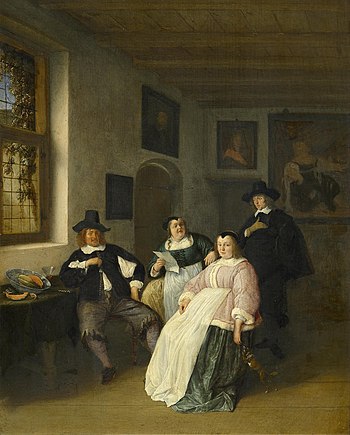
|
Adriaen van Ostade (1610–1685) was a Dutch Golden Age painter. He was a prolific artist, and is best known for his genre art, with scenes or events from everyday life, such as markets, domestic settings, interiors, parties, inn scenes, and street scenes. This oil-on-panel painting, dating to between 1650 and 1655, is entitled The De Goyer family and the painter; Ostade is shown standing on the right. The other people depicted are the seated Hendrick de Goyer, steward of Heemstede; his future wife Anna Questiers, in pink; and her sister, the poet Catharina Questiers, in the centre, perhaps reading one of her poems. The painting is in the collection of the Museum Bredius in The Hague. Painting credit: Adriaen van Ostade
Recently featured:
|
July 4

|
|
Enallagma cyathigerum, the common blue damselfly, is a species of damselfly in the family Coenagrionidae. The species is widely distributed across the Palearctic realm and can reach a length of 32 to 35 mm (1.3 to 1.4 in). This composite photograph, taken in Oxfordshire, England, shows a pair of E. cyathigerum damselflies preparing to mate. Having transferred a bundle of sperm known as a spermatophore to secondary genitalia on the third segment of his abdomen, the blue-coloured male grasps the dull-coloured female by the head with the claspers at the tip of his abdomen. The female then curls her abdomen downwards and forwards under his body to pick up the sperm from the male's secondary genitalia. The distinctive posture that the pair adopt when transferring sperm is often called the "heart" or "wheel". Photograph credit: Charles J. Sharp
Recently featured:
|
July 5
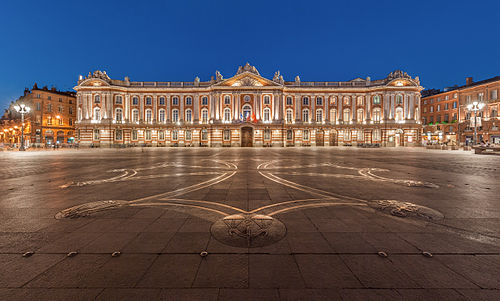
|
|
The Capitole is the heart of the municipal administration of the French city of Toulouse. The current façade, 135 m (443 ft) long and built of characteristic pink brick in the Neoclassical style, dates from 1750, while the structures surrounding the Place du Capitole, the large square in front of the building, were redesigned in the first half of the 19th century. Today, the Capitole serves as Toulouse's city hall, as well as housing an opera company and a national orchestra. A thorough redesign of the Place du Capitole in 1995 reserved the space for pedestrians, and incorporated a large Occitan cross on the ground, a symbol of the historical region of Occitania. Photograph credit: Benh Lieu Song
Recently featured:
|
July 6

|
Giuseppe Tominz (6 July 1790 – 24 April 1866) was an Italian-Slovenian portrait painter. His work was influenced by late Classicism and the style of Viennese artists of the Biedermeier period. The individuals in his portraits have sharp features and clear forms, but despite this the depictions are realistic, sometimes with an ironic touch. The backgrounds are filled with landscapes or the city from which the person depicted originated. Tominz painted this oil-on-canvas portrait of Pietro Stanislao Parisi and his family in 1849. Parisi was head of a trading company, still active in Trieste today; the shipping visible in the background represents the family's mercantile interests. The painting is currently held in a private collection in Rome. Painting credit: Giuseppe Tominz
Recently featured:
|
July 7

|
The Tadoba Andhari Tiger Reserve is the largest national park in the state of Maharashtra in central India. Most of the reserve consists of natural dry deciduous forests, however parts have been cleared for firewood or grazing land. Besides tigers, there are Indian leopards, sloth bears, gaurs, nilgais, dholes, striped hyenas, small Indian civets, jungle cats, sambars, muntjacs, chitals, chousinghas and honey badgers. There are also villages in the reserve, and although cattle grazing is not allowed in the core zone, some livestock inevitably stray inside. In 2013, at least four people and thirty to fifty cattle were killed by leopards, tigers and sloth bears. This picture shows a Bengal tigress named Maya photographed in the reserve. Photograph credit: Stephenekka
Recently featured:
|
July 8

|
Bedroom in Arles is the title given to each of three similar oil-on-canvas paintings by 19th-century Dutch Post-Impressionist painter Vincent van Gogh. The picture shows his bedroom at 2 Place Lamartine in Arles, France, known as the Yellow House, where he lived in 1888. The door to the right opened onto the upper floor and the staircase, the door to the left was that of the guest room he held prepared for Paul Gauguin, and the window in the front wall looked out onto public gardens. The first version of the painting was damaged in a flood, so he painted a second. The paintings vary slightly in their colours and details, especially with regard to the pictures hanging on the walls. This picture is the third, a reduced-size version painted in 1889 for his mother and sister. It was acquired for the French national collections in 1959, and is on permanent display in the Musée d'Orsay, Paris. Painting credit: Vincent van Gogh
Recently featured:
|
July 9

|
Zachary Taylor (November 24, 1784 – July 9, 1850) was the 12th president of the United States, serving from March 4, 1849, until his death in office the following year. He was previously a career officer in the United States Army, rose to the rank of major general and became a national hero as a result of his victories in the Mexican–American War. As a result, he won election to the White House despite his vague political beliefs. On July 4, 1850, Taylor reportedly consumed copious amounts of raw fruit and iced milk while attending holiday celebrations during a fundraising event at the Washington Monument. Over the course of several days, he became severely ill with an unknown digestive ailment, several of his cabinet members being similarly affected. Despite treatment, Taylor died five days later. His vice-president Millard Fillmore assumed the presidency and completed his term in office. Engraving credit: Bureau of Engraving and Printing; restored by Andrew Shiva
Recently featured:
|
July 10

|
The Wyoming Territory was an organized incorporated territory in the western United States that existed from July 25, 1868, until July 10, 1890, when it was admitted to the Union as the state of Wyoming. This picture is a historical depiction of the Wyoming Territory's coat of arms, as illustrated by American engraver Henry Mitchell in State Arms of the Union, published in 1876 by Louis Prang. The escutcheon depicts a railroad train in front of a mountainous landscape in the top half, agricultural tools in the bottom left, and an arm holding a sword in the bottom right. Under the shield is the Latin motto Cedant arma togae (misspelled in this depiction as Oedant arma toga), literally meaning "Let arms yield to the toga", but often translated as "Let military power be subject to civil authority". Illustration credit: Henry Mitchell; restored by Andrew Shiva
Recently featured:
|
July 11

|
Pura Ulun Danu Bratan is a major Hindu Shaivite temple located on the shore of Lake Bratan in Bali, Indonesia. Built in 1633, the temple is used for the ceremony of offerings to the Balinese water, lake and river goddess Dewi Danu, due to the importance of Lake Bratan as a main source of water for irrigation in central Bali. The temple is laid out with three courtyards separated by low walls pierced by ornate gateways. The inner courtyard houses the shrines, which are square structures with brick bases and multiple pagoda-style thatched roofs, the number of roofs reflecting the status of the deity; it is always an odd number, and the eleven at this temple indicate the importance of Dewi Danu. Photograph credit: Uwe Aranas
Recently featured:
|
July 12

|
|
Arii Matamoe is an oil painting on coarse cloth by the French artist Paul Gauguin. Created in 1892, during the painter's first visit to Tahiti, Gauguin described it to a correspondent as the severed head of a Pacific Islander, "nicely arranged on a white cushion, in a palace of my invention and guarded by women also of my invention". The painting may have been inspired by the death of Pōmare V, the last Tahitian king, but is not representative of common or contemporary Tahitian mourning rituals. It depicts a despairing nude woman crouching near the displayed head, while a figure outside seems to proclaim the man's death to other people further away. The Tahitian words "Arii Matamoe", inscribed in the upper left above the head, respectively mean 'noble' and 'sleeping eyes' (implying death). The painting is in the collection of the J. Paul Getty Museum in Los Angeles. Painting credit: Paul Gauguin
Recently featured:
|
July 13
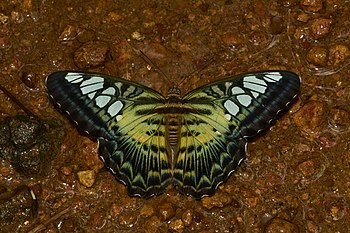
|
Parthenos sylvia, commonly known as the clipper, is a species of nymphalid butterfly found in forested areas of southern and southeastern Asia. This butterfly, photographed in Kerala, India, is puddling in a film of shallow water at the edge of a stream. Puddling is a behavior whereby butterflies, and some other insects, suck up fluids from mud, carrion, excrement, or rotting plant material, in order to fulfil their physiological needs for certain minerals and amino acids. When the conditions are suitable, butterflies commonly form conspicuous aggregations on wet soil, and some species are also attracted to body fluids such as sweat or tears. Photograph credit: Jeevan Jose
Recently featured:
|
July 14
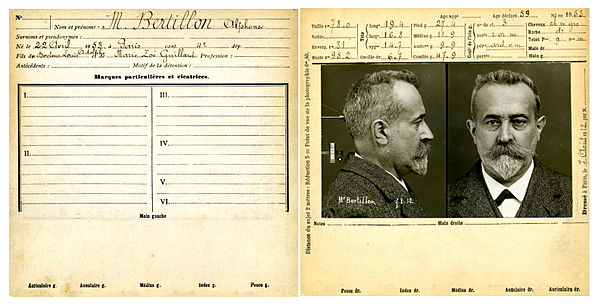
|
|
Alphonse Bertillon (1853–1914) was a French police officer and biometrics researcher who applied the anthropological technique of anthropometry to law enforcement, creating an identification system based on physical measurements. It was the first scientific system used by police to identify criminals, and was eventually supplanted by fingerprinting. The Bertillon system consisted of five initial measurements – head length, head breadth, length of middle finger, length of left foot, and length of forearm. Along with these measurements, Bertillon used photography, now known as a mug shot, to complete the record. This image shows both sides of an anthropometric data sheet for Bertillon himself. Photograph credit: Jebulon
Recently featured:
|
July 15
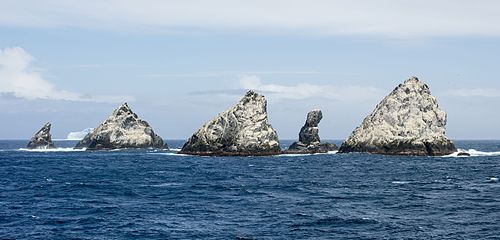
|
|
The Shag Rocks are a group of six small islets in the southern Atlantic Ocean, 240 km (150 mi) west of the island of South Georgia and 1,000 km (620 mi) southeast of the Falkland Islands. The islets, the tallest of which reaches 75 m (246 ft), are administered by the United Kingdom as part of the overseas territory of South Georgia and the South Sandwich Islands. Largely devoid of vegetation, the bare rock is covered by a layer of guano deposited by the large numbers of South Georgia shags that nest there. The shags are the only breeding bird on the islets, but the relatively shallow waters surrounding the rocks, part of the continental shelf, are feeding grounds for many other species of seabird. In this photograph of the islets, an iceberg can be seen in the distance at left. Photograph credit: Andrew Shiva
Recently featured:
|
July 16
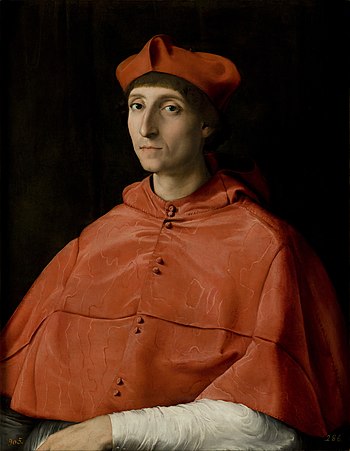
|
Francesco Alidosi (1455–1511) was an Italian cardinal and condottiero. He accompanied Giuliano della Rovere to France in 1494, and continued to serve him when della Rovere became Pope Julius II. Alidosi was elected the bishop of Mileto in 1504, and was transferred to the see of Pavia in 1505. He exerted much influence over the pope, who put great trust in him; however, he also made many enemies. In 1510, he was accused of high treason, but persuaded the pope that Francesco Maria I della Rovere, Duke of Urbino, was in fact the guilty party. The duke was infuriated and had Alidosi killed by his troops. This oil-on-panel painting, entitled Portrait of a Cardinal, was painted by Italian Renaissance artist Raphael around 1510; the identity of the sitter is uncertain, but may be Alidosi. The work is in the collection of the Museo del Prado in Madrid, Spain. Painting credit: Raphael
Recently featured:
|
July 17
Subpage 1
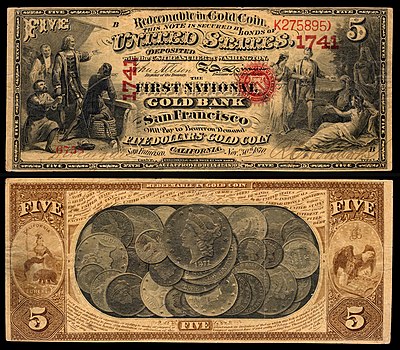
|
National Gold Bank Notes were issued by banks in California in the 1870s and 1880s, following the California Gold Rush. Gold coinage was the preferred means of exchange during this period but coinage was difficult for larger transactions, so these national bank notes were issued, redeemable in gold. Printed on yellow-tinted paper, the six denominations that circulated were $5, $10, $20, $50, $100, and $500. A $1,000 note was designed and printed, but never issued. Today, the higher-denomination notes are very rare, and only about 630 National Gold Bank Notes of all denominations are known still to be in existence. This picture shows a five-dollar National Gold Bank Note issued by the First National Gold Bank of San Francisco. The note is hand-signed by Edwin D. Morgan and Ralph C. Woolworth, the bank's cashier and president, respectively. Other denominations:Banknote design credit: Continental Bank Note Company; photographed by Andrew Shiva
Recently featured:
|
Subpage 2

|
National Gold Bank Notes were issued by banks in California in the 1870s and 1880s, following the California Gold Rush. Gold coinage was the preferred means of exchange during this period but coinage was difficult for larger transactions, so these national bank notes were issued, redeemable in gold. Printed on yellow-tinted paper, the six denominations that circulated were $5, $10, $20, $50, $100, and $500. A $1,000 note was designed and printed, but never issued. Today, the higher-denomination notes are very rare, and only about 630 National Gold Bank Notes of all denominations are known still to be in existence. This picture shows a ten-dollar National Gold Bank Note issued by the First National Gold Bank of Oakland. The note is hand-signed by Galen M. Fisher and Benjamin F. Ferris, the bank's cashier and president, respectively. Other denominations:Banknote design credit: Continental Bank Note Company; photographed by Andrew Shiva
Recently featured:
|
Subpage 3
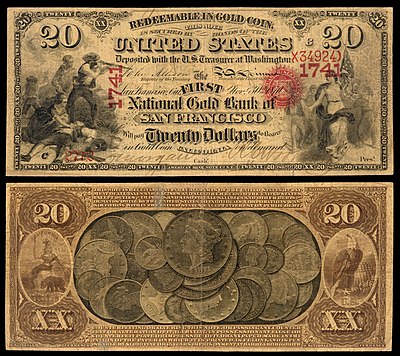
|
National Gold Bank Notes were issued by banks in California in the 1870s and 1880s, following the California Gold Rush. Gold coinage was the preferred means of exchange during this period but coinage was difficult for larger transactions, so these national bank notes were issued, redeemable in gold. Printed on yellow-tinted paper, the six denominations that circulated were $5, $10, $20, $50, $100, and $500. A $1,000 note was designed and printed, but never issued. Today, the higher-denomination notes are very rare, and only about 630 National Gold Bank Notes of all denominations are known still to be in existence. This picture shows a twenty-dollar National Gold Bank Note issued by the First National Gold Bank of San Francisco. The note is hand-signed by Edwin D. Morgan and Ralph C. Woolworth, the bank's cashier and president, respectively. Other denominations:Banknote design credit: Continental Bank Note Company; photographed by Andrew Shiva
Recently featured:
|
Subpage 4

|
National Gold Bank Notes were issued by banks in California in the 1870s and 1880s, following the California Gold Rush. Gold coinage was the preferred means of exchange during this period but coinage was difficult for larger transactions, so these national bank notes were issued, redeemable in gold. Printed on yellow-tinted paper, the six denominations that circulated were $5, $10, $20, $50, $100, and $500. A $1,000 note was designed and printed, but never issued. Today, the higher-denomination notes are very rare, and only about 630 National Gold Bank Notes of all denominations are known still to be in existence. This picture shows a fifty-dollar National Gold Bank Note issued by the First National Gold Bank of San Francisco. The note is hand-signed by Edwin D. Morgan and Ralph C. Woolworth, the bank's cashier and president, respectively. Other denominations:Banknote design credit: Continental Bank Note Company; photographed by Andrew Shiva
Recently featured:
|
Subpage 5

|
National Gold Bank Notes were issued by banks in California in the 1870s and 1880s, following the California Gold Rush. Gold coinage was the preferred means of exchange during this period but coinage was difficult for larger transactions, so these national bank notes were issued, redeemable in gold. Printed on yellow-tinted paper, the six denominations that circulated were $5, $10, $20, $50, $100, and $500. A $1,000 note was designed and printed, but never issued. Today, the higher-denomination notes are very rare, and only about 630 National Gold Bank Notes of all denominations are known still to be in existence. This picture shows a one-hundred-dollar National Gold Bank Note issued by the First National Gold Bank of Petaluma. The note is hand-signed by Henry H. Atwater and Isaac G. Wickersham, the bank's cashier and president, respectively. Other denominations:Banknote design credit: Continental Bank Note Company; photographed by Andrew Shiva
Recently featured:
|
July 18
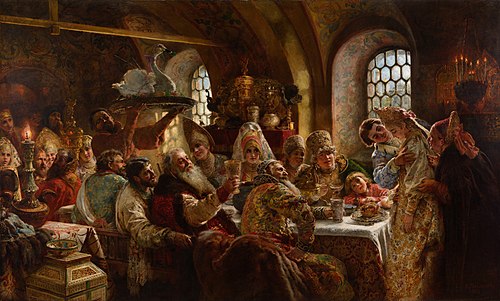
|
|
A Boyar Wedding Feast is an oil-on-canvas painting created by Russian artist Konstantin Makovsky in 1883. The boyars were members of the highest rank of the feudal aristocracy of Russia in the 16th and 17th centuries, and a wedding was an important social event. In this painting, the guests are depicted toasting a newlywed couple. They stand at the head of the table, where the groom sees his bride without her veil for the first time; she appears timid and bashful as the men toast for the first kiss. Behind the couple, the Lady of Ceremony gently urges on the bride. A roasted swan is being brought in on a large platter, the last dish to be served before the couple retires to the bedroom. The work is in the collection of the Hillwood Estate, Museum & Gardens, in Washington, D.C. Painting credit: Konstantin Makovsky
Recently featured:
|
July 19

|
|
The Castle of Zafra is a 12th-century castle located in the municipality of Campillo de Dueñas, in the Spanish province of Guadalajara. Built in the late 12th or early 13th century on a sandstone outcrop in the Sierra de Caldereros, it stands on the site of a former Visigothic and Moorish fortification that fell into Christian hands in 1129. It had considerable strategic importance as a virtually impregnable defensive work on the border between Christian- and Muslim-ruled territory. It was never conquered and was successfully defended against the king of Castile in the 13th century, but by the end of the 15th century, it had lost its military significance. Photograph credit: Diego Delso
Recently featured:
|
July 20
|
The wire-tailed swallow (Hirundo smithii) is a small passerine bird in the swallow family, found in Africa and southern Asia, and often seen flying low over water. It has bright blue upperparts, white underparts and a chestnut cap; adults have long filamentous outermost tail feathers, which trail behind during flight, but juveniles lack these. This pair of images shows an adult wire-tailed swallow feeding a perched juvenile with insects it has caught in flight. The juvenile opens its bill ready to be fed, and the adult thrusts a beakload of insects into the juvenile's mouth. Photograph credit: Manojiritty
Recently featured:
|
July 21
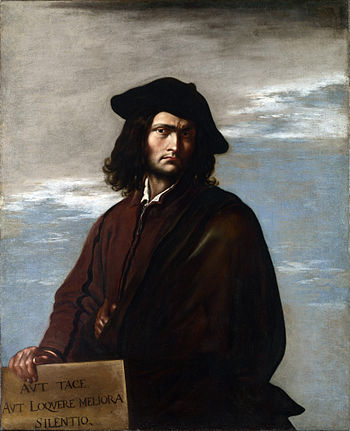
|
Salvator Rosa (June 20 or July 21, 1615 – March 15, 1673) was an Italian Baroque artist, poet, and printmaker who was active in Naples, Rome and Florence. In his art, he is best remembered for his landscapes in which he created brooding, melancholic fantasies, awash with ruins and brigands. He refused to paint on commission, instead choosing his own subjects purely for his own satisfaction. He was regarded as a "perpetual rebel". This oil-on-canvas self-portrait, entitled Philosophy, dates from around 1645 and shows Rosa wearing a scholar's cap and brown gown, as a personification of philosophy. Half of his face is in shadow, and the cold lighting emphasises his long, narrow nose, his furrowed brow and unkempt hair. The Latin inscription on the tablet, Aut tace aut loquere meliora silentio, is taken from Stobaeus's Anthologia, and translates to 'Either be silent or say something better than silence'. The painting now hangs in the National Gallery, London. Painting credit: Salvator Rosa
Recently featured:
|
July 22

|
|
The Toilette is the fourth of a series of six oil-on-canvas paintings by English painter and pictorial satirist William Hogarth, created around 1743. The series, entitled Marriage A-la-Mode, depicts an arranged marriage and its disastrous consequences in a satire of 18th-century society, and is now in the collection of the National Gallery in London. In this picture, titled The countess's morning levee by Hogarth, the old Earl Squanderfield has died; his son is now the new earl, and his wife the countess. She is holding a reception during her "toilette" in her bedroom. The fact that Hogarth ridiculed this gathering of people in the bedroom of a noble during their "morning" grooming shows that such a convocation in such an intimate room was increasingly viewed as inappropriate. While the countess is having her hair attended to, she is ignoring her guests and having a dalliance with her lawyer, Silvertongue, who is lounging on the sofa. Painting credit: William Hogarth
Recently featured:
|
July 23

|
|
Eileen Collins (born 1956) at the commander's station on the Space Shuttle Columbia during STS-93, which launched on July 23, 1999, making Collins the first female commander of a U.S. spacecraft. A now retired NASA astronaut and United States Air Force colonel, she is a veteran of four space missions. On her first spaceflight in 1995, STS-63, she became the first female Shuttle pilot and returned to space as a pilot on STS-84. After commanding STS-93, Collins also commanded the STS-114 mission in 2005. Photograph credit: NASA
Recently featured:
|
July 24

|
The goldcrest (Regulus regulus) is a passerine bird in the kinglet family, Regulidae. It occurs in mature lowland and mountain coniferous woodlands and has a wide range which extends from Iceland, the Canary Islands and Western Europe through southern Siberia to Sakhalin, Japan and Central China. It has olive-green upperparts, buff-white underparts, two white wing bars, and a plain face with conspicuous black irises. The black crown has a distinctive yellow crest with an orange centre in the male while the female's crest is pure yellow; in other respects the sexes are similar. It is the smallest European bird, with a weight of 4.5–7.0 g (0.16–0.25 oz). This picture shows a female goldcrest photographed in Lancashire, England. Photograph credit: Francis C. Franklin
Recently featured:
|
July 25

|
|
Ixion is an oil-on-canvas painting by the Spanish artist Jusepe de Ribera, signed and dated 1632. It depicts the myth of the eternal punishment meted out by Jupiter on finding the giant Ixion in the bed of his wife Juno. The picture shows the giant tied to a perpetually turning wheel. The condemned man is depicted face down, his agony expressed by his contorted position and strained muscles, the dramatic tension being accentuated by the lighting. His enormous body, animated by the circular movement of his punishment, issues from a black background and seems to be toppling towards the viewer. Below and to the left is his tormentor, a satyr with horns and pointed ears, who is gesturing fiercely towards his victim. This painting was part of a series of four paintings; the other three showed the tortures of Sisyphus, Tantalus and Tityos. Only Ixion and Tityos survive, both in the collection of the Museo del Prado in Madrid. Painting credit: Jusepe de Ribera
Recently featured:
|
July 26
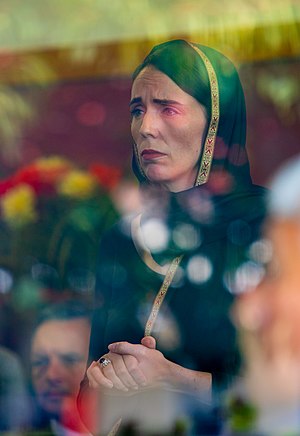
|
Jacinda Ardern (born 26 July 1980) is a New Zealand politician who has served as the 40th prime minister of New Zealand and the leader of the Labour Party since 2017, when she became the world's youngest female head of government. In March 2019, Ardern led the country through the aftermath of mass shootings at two mosques in Christchurch, rapidly introducing strict gun laws in response. This photograph, taken through a glass window, shows her visiting members of the Muslim community at a community centre in Phillipstown less than 24 hours after the attacks, which had left 50 people dead (one more would die later). Widely circulated at the time, the photograph was described by The Guardian as an "image of hope". Photograph credit: Kirk Hargreaves
Recently featured:
|
July 27

|
|
The Belgian franc was the currency of the Kingdom of Belgium from 1832 until 2002, when the euro was introduced. The Belgian mint was innovative, and in 1860, the country became the first to introduce coins made of cupronickel. A few years later, in 1865, Belgium formed the Latin Monetary Union with France, Switzerland and Italy (Greece joined the system later), which facilitated trade between the countries by setting standards by which gold and silver currency could be minted and exchanged. This 40-franc gold coin was minted in 1835, and depicts Leopold I, the first king of the Belgians following the country's independence in 1830, on the obverse. The coin is now part of the National Numismatic Collection at the Smithsonian Institution's National Museum of American History. Coin design credit: Kingdom of Belgium; photographed by the National Numismatic Collection
Recently featured:
|
July 28

|
Cirsium eriophorum, the woolly thistle, is a large herbaceous biennial plant in the daisy family, Asteraceae. It is native to Central and Western Europe, where it grows in grassland and open scrubland. Several parts of the plant are edible; the young leaves can be eaten raw, the young stems can be peeled and boiled, and the flower buds can be consumed in a similar way to artichokes. This picture shows a C. eriophorum flower head photographed in Kozara National Park, in Republika Srpska, Bosnia and Herzegovina. Photograph credit: Petar Milošević
Recently featured:
|
July 29

|
Thomas Corwin (July 29, 1794 – December 18, 1865) was a politician from the U.S. state of Ohio. He represented Ohio in both houses of Congress, and served as the 15th governor of Ohio from 1840 to 1842 and the 20th U.S. secretary of the treasury from 1850 to 1853. He is best known for his sponsorship of the proposed Corwin Amendment, which was presented in an unsuccessful attempt to avoid the oncoming American Civil War. This picture is a line engraving of Corwin, produced around 1902 by the Department of the Treasury's Bureau of Engraving and Printing (BEP), as part of a BEP presentation album of the first 42 secretaries of the treasury. Engraving credit: Bureau of Engraving and Printing; restored by Andrew Shiva
Recently featured:
|
July 30

|
John the Baptist was the subject of at least eight paintings by the Italian Baroque artist Michelangelo Merisi da Caravaggio. This work, a brooding, "psychologically interiorized" oil-on-canvas portrait of John the Baptist as a young adult, shows him without any of his usual symbolic attributes (except for the cross he holds), and is considered by scholars the most radical portrait of the series. Caravaggio's unusual practice of composing directly on the canvas without any underpainting, incising salient features with the blunt end of his brush handle, or perhaps with a knife, is evident here particularly on John's left leg. This painting is in the collection of the Nelson-Atkins Museum of Art in Kansas City, Missouri. Painting credit: Caravaggio
Recently featured:
|
July 31

|
Typhoon Noru was the second-longest lasting tropical cyclone of the northwest Pacific Ocean on record. The fifth named storm of the 2017 Pacific typhoon season, it formed on July 19 and reached peak intensity on July 31 with 175 km/h (110 mph) 10-minute sustained winds. By this time, as shown in this satellite image, the typhoon was located south of Iwo Jima, and had taken on annular characteristics, with a symmetric ring of deep convection surrounding a 30 km (19 mi) well defined eye and fairly uniform cloud top temperatures. Traveling northwestward over an area of low ocean heat content, the eye became enlarged and ragged as the system weakened. By the time Noru made landfall over Wakayama Prefecture, Japan, on August 7, it had been downgraded to a severe tropical storm. It then dissipated over the Sea of Japan on August 9 as an extratropical cyclone. Photograph credit: NASA; edited by Meow
Recently featured:
|
Picture of the day archives and future dates


